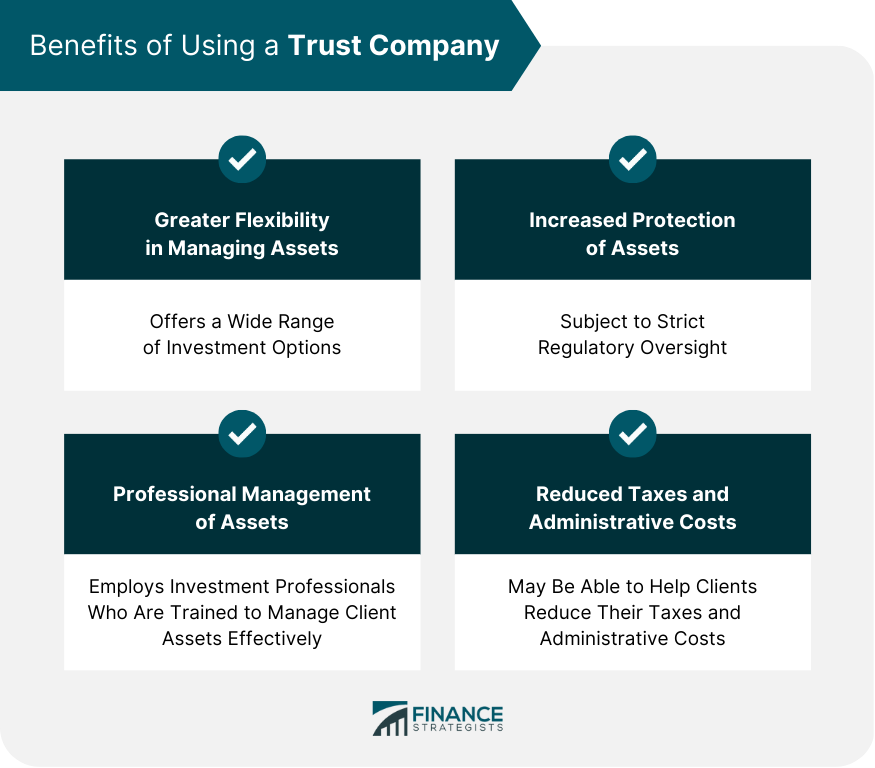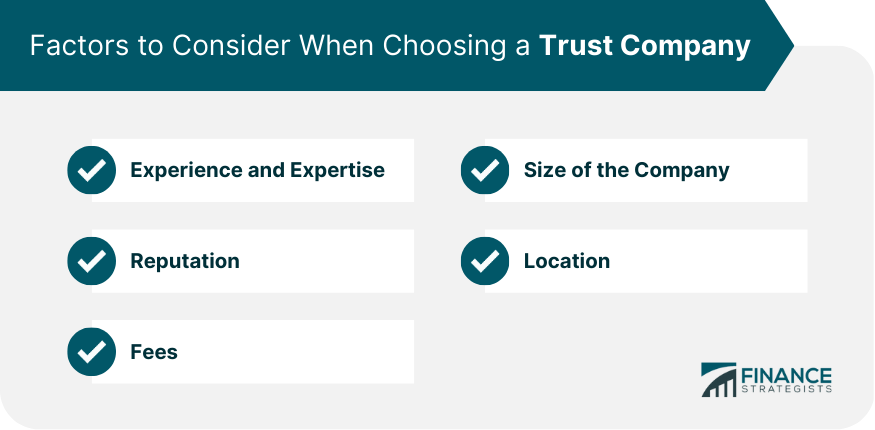A trust company is a financial institution that specializes in managing trusts, among other things. A trust is a legal agreement in which an individual or organization (the trustor) transfers assets to a trustee. The trustee is then responsible for managing those assets for the benefit of the trust's beneficiaries in accordance with the terms of the trust agreement. Trust companies are often considered more specialized than traditional banks because they focus solely on trust and investment management services. This specialization offers their clients a more comprehensive range of investment options, better expertise, and more tailored services. Trust companies offer various services to their clients. Some of the most common services provided by trust companies include: Management of Trusts. As mentioned earlier, trust companies specialize in managing trusts. They provide a range of trust administration services, including managing trust assets, distributing trust income and principal, and ensuring compliance with trust agreements and legal requirements. Estate Planning and Administration. Trust companies also provide estate planning and administration services. They can help clients plan to transfer their assets after their death, including creating wills, trusts, and other estate planning documents. Investment Management. Trust companies are often known for their expertise in investment management. They offer portfolio management, financial planning, and investment advice. Corporate Trust. Companies also offer various corporate trust services, including acting as a trustee for corporate bond issues, managing employee benefit plans, and administering securities offerings. Trust companies may also provide specialized services, depending on their expertise. Other Services. In addition to the abovementioned services, trust companies may offer other financial services, such as banking, lending, and insurance products. Using a trust company can offer a range of benefits to individuals and organizations. Some of the most significant benefits of using a trusted company include the following: Greater Flexibility in Managing Assets. Trust companies offer various investment options, including access to specialized investments and investment managers. Increased Protection of Assets. Trust companies are subject to strict regulatory oversight, meaning they must act in their client's best interests. Professional Management of Assets. Trust companies employ investment professionals trained to manage client assets effectively. Reduced Taxes and Administrative Costs. Trust companies can help clients reduce their taxes and administrative costs. For example, clients can reduce their estate taxes or avoid probate costs by setting up a trust. If you are considering using a trust company, consider a few factors when selecting the right one for your needs. Some of the most important factors to consider include the following: Experience and Expertise. Look for a trust company with experience managing trusts and investments like yours. Make sure the company has expertise in the areas where you need assistance, such as estate planning or corporate trust services. Reputation. Choose a trust company with a good reputation in the industry. Look for reviews and recommendations from clients and other professionals in the field. Fees. Make sure you understand the fee structure of the trust company you are considering. Ask for a breakdown of all fees, including management fees, transaction fees, and other costs associated with your required services. Size of the Company. Consider the size of the trust company and whether it is the right fit for your needs. Smaller companies may offer more personalized service, while larger companies may have more resources and expertise. Location. Consider the location of the trust company and whether it is convenient for you. While many trust companies offer remote services, some clients prefer to work with a company in their area. Once you have narrowed your options, consider scheduling a meeting or consultation with the trust company to discuss your needs and ensure they fit you. A trust company offers specialized services for managing trusts and investments, including estate planning, investment management, and corporate trust services. Choosing a trust company can provide greater flexibility, increased asset protection, professional asset management, and reduced taxes and administrative costs. When selecting a trust company, consider its experience, reputation, fees, size, and location. You can effectively achieve your financial goals and manage your assets with the right trust company. However, managing your finances can be a daunting task, and it is something you should do with others. That is why hiring a financial advisor or an estate planning attorney can help you navigate the complexities of managing your assets. These professionals can provide personalized guidance and support, help you develop a financial plan, and work with you to achieve your goals. What Is a Trust Company?
Services Offered by Trust Companies
Trust companies can also assist with the administration of estates, including managing assets, paying debts, and distributing assets to beneficiaries.
Trust companies may also provide specialized investment options, such as alternative or socially responsible investments.Benefits of Using a Trust Company
This flexibility can help clients achieve their investment goals more effectively than they could.
This can provide greater protection for client assets than if an individual or organization managed them without the same regulatory oversight.
This professional management can lead to better investment results and reduce the risk of errors or oversights.
Choosing a Trust Company

Conclusion
Trust Company FAQs
A trust company is a financial institution that manages trusts and provides other investment and financial services to individuals and organizations.
Trust companies offer various services, including trust management, estate planning and administration, investment management, corporate trust services, and other financial services.
Using a trust company can provide greater flexibility in managing assets, increased protection of assets, professional asset management, and reduced taxes and administrative costs.
When choosing a trust company, consider their experience, expertise, reputation, fees, size, and location. It is also good to schedule a meeting or consultation to discuss your needs and ensure the company fits you.
While a trust company can provide specialized services for managing your assets, hiring a financial advisor can offer personalized guidance and support, helping you develop a financial plan and work towards your financial goals.
True Tamplin is a published author, public speaker, CEO of UpDigital, and founder of Finance Strategists.
True is a Certified Educator in Personal Finance (CEPF®), author of The Handy Financial Ratios Guide, a member of the Society for Advancing Business Editing and Writing, contributes to his financial education site, Finance Strategists, and has spoken to various financial communities such as the CFA Institute, as well as university students like his Alma mater, Biola University, where he received a bachelor of science in business and data analytics.
To learn more about True, visit his personal website or view his author profiles on Amazon, Nasdaq and Forbes.















